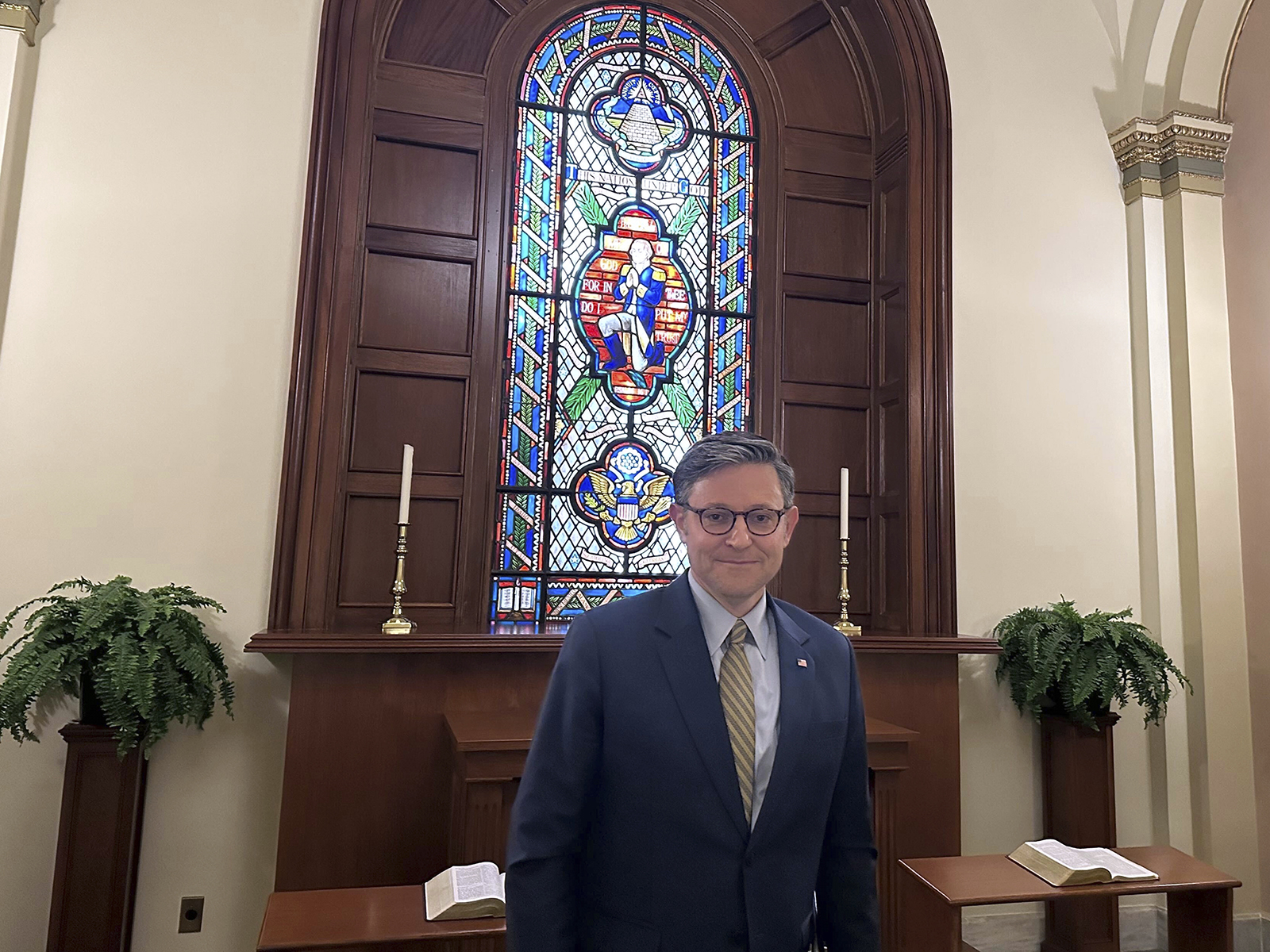
(RNS) — As Mike Johnson ascended to the House of Representatives speaker’s chair in October 2023, he quickly showed off his evangelical Christian faith. He led the GOP caucus in prayer at a press conference, declared during his acceptance remarks in the House chamber that God had elevated him to that position, and told Sean Hannity that his position on issues came from the Bible.
But another way he has sought to publicize his faith actually violates the founding spirit of a sacred space in the United States Capitol.
With a Fox News camera rolling back in 2023, a newly elected Johnson took on-air contributor Kayleigh McEnany, former press secretary for President Donald Trump, into the congressional prayer room. After pointing out features of the private chapel for McEnany and her audience, Johnson announced he would “be using it every morning.” As McEnany expressed excitement to hear about his personal ritual, he added, “This will be my discipline, to come in here and seek the Lord’s guidance for what we do each day.”
Johnson again posed in the congressional chapel a couple weeks ago as the vote on Trump’s so-called big, beautiful bill neared. Seeing an Associated Press reporter in the Capitol, Johnson brought her into the chapel, where he posed for a photo and bragged about his prayer life: “Been here a lot this week, right there on my knees,” Johnson told the AP. “Just praying. … That’s what the founders did.”
However, the room is much more modern. Congress didn’t open the private chapel for members until 1954. As Beau Underwood and I documented in “Baptizing America,” the creation of the chapel was one of many ways lawmakers in that era advanced Christian nationalism. Yet, as much as Johnson seems to like the room, he must not have paid attention to what lawmakers said when they voted to designate a room for private prayer.
Rep. Brooks Hays, D-Ark., sponsored the House resolution that led to the chapel’s creation. Like Johnson, Hays was a Southern Baptist active in denominational life. Hays even served as president of the Southern Baptist Convention while in Congress. When the resolution to create a chapel came to the floor in July 1953, Rep. Sam Rayburn, D-Texas, the past and future House speaker who was also a Baptist, quickly raised a concern.
“I am quite in accord with this resolution and all for which it stands,” Rayburn said. “But I do trust that there will not be a show made of this thing and that there will be no motion pictures of what takes place in this room. If it is going to be sacred … I do trust that never will any motion pictures be taken of members in this room who want to be alone with their God. I trust whoever is in charge of it will not make a showplace of it.”
Rep. Karl LeCompte, R-Iowa, who was in charge of the floor debate for the bill, quickly agreed: “I heartily approve of every word said by the former speaker.”
Hays then started his remarks for his resolution by insisting he also would “endorse wholeheartedly” Rayburn’s admonition against using the room for public display, insisting it was a restriction he and others working to create a congressional chapel intended “from the beginning.”
Similarly, Rep. Richard Poff, R-Va., expressed his support for the proposed chapel since it would be a small, private room instead of a large hall “through which demagogues and hypocrites can parade their religion.”
With that expectation of privacy in the chapel, lawmakers in both houses approved its creation, with Hays then leading a committee to plan its design.
But nearly seven decades later, the new speaker quickly ignored the expectations and trust of his predecessors. While Johnson didn’t let Fox News or the AP film him praying, he brought the cameras in as he talked about his prayers in there. The whole performance came as he cast himself as holy and his political opponents as anti-Christian. He weaponized what was intended as a nonpartisan, nonsectarian, private prayer room.
Johnson’s misuse of the congressional prayer room for the cameras shows his Christian nationalism at play. He’s frequently preached about his vision of the U.S. as “a Christian nation” and has long worked to tear down the wall separating church and state that colonial Baptists sought to build. But the prayer room isn’t his space to use as he pleases. Nor was the nation designed just for his brand of Christianity.
As lawmakers in both parties argued while they approved the creation of a congressional prayer room, the political exploitation of religion is disgraceful. As a Baptist minister, I would warn my fellow Baptist serving as speaker that it also goes against Jesus’ teachings about prayer.
Jesus warned about hypocrites who love to pray where they can be seen by others. When Jesus said to go pray in a closet, he didn’t mean you should then show it off to Fox News or The Associated Press.
Hays, the congressman and future president of the SBC, said while he explained his resolution to create the private congressional prayer room: “I know every member of the House would share my conviction that to exploit religious faith is ignoble.” Johnson should try meditating on that in a private closet somewhere.
(Brian Kaylor, a Baptist minister with a Ph.D. in political communication, is co-author of “Baptizing America: How Mainline Protestants Helped Build Christian Nationalism” and writes about faith and politics at A Public Witness. The views expressed in this commentary do not necessarily reflect those of Religion News Service.)
